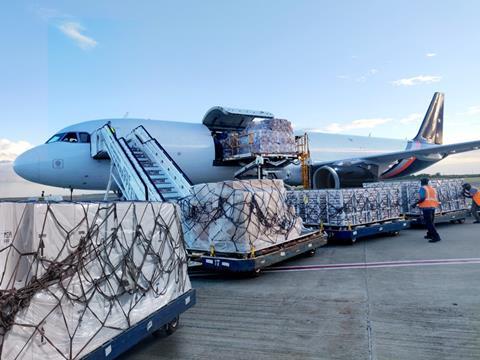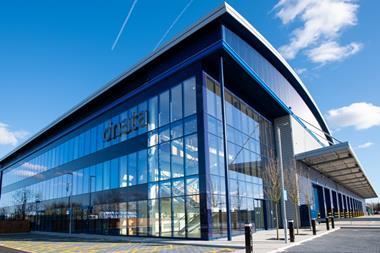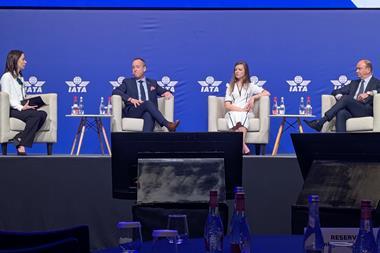Virgin Atlantic Cargo’s managing director Phil Wardlaw joined the team late last year and faces the challenge of navigating the division through a rapidly changing market.
He moved over to cargo with more than 30 years in operations and engineering roles and joined at a time when the cargo team was reporting record results thanks to buoyant rates and rising demand for air transportation.
However, since then the market has changed with passenger services coming back online and demand beginning to wain.
“It was an exciting time to join but knowing that at some point that market was going to change,” Warlaw said.
“That makes it really exciting in itself. It adds another dimension to the challenge that was presented to me at the time.
“There is an excitement in having to make your way out of highs as well. I know that sounds a bit counter intuitive, but it is interesting as well.”
Wardlaw says that the Virgin Atlantic network is back up to 95% of its pre-pandemic levels.
But while the network continues to recover there are two key cargo destinations that the airline isn’t currently serving: Shanghai and Hong Kong.
The carrier stopped flying to the Asian airports due to Covid restrictions.
Wardlaw says the airline hopes to add Hong Kong flights back in from September but it is unlikely Shanghai will return this year, although the situation is constantly being evaluated.
However, Wardlaw says that this has allowed Virgin Atlantic to use the aircraft to add destinations or increase frequencies elsewhere.
Virgin Atlantic’s main trade is the north Atlantic, which represents around 70% of the carrier’s routes, and here Wardlaw says the market is back to pre-pandemic levels.
“From a market perspective [north Atlantic] capacity is broadly speaking fully back to pre-Covid levels,” he says.
“Arguably, over the next couple of months, it could go beyond that because of some of the other global issues – China/Hong Kong and restricted flying into those destinations and the Ukraine war – means there is probably more capacity coming across the north Atlantic than we would have envisaged at the turn of the year.
“Undoubtedly that is starting to impact pricing across the North Atlantic lanes, although pricing is still well ahead of where it was in pre-Covid times.”
With this in mind, Wardlaw says it is unlikely that 2022 will be another record year for the cargo business after it saw revenues increase 40% to £448m last year.
“We had a record first quarter this year and also a record April so the beginning of the year was really fantastic results again from the team,” he says.
“But I think the reality is that with the onset of war in Ukraine, flight restrictions and then dropping the Shanghai and Hong Kong routes, then I don't think we will be reporting record revenues again.”
Freighter first
One development that is set to continue for the time being is the deployment of the airline’s first freighter.
The carrier added all-cargo operations in May to replace a cargo-only flight it had operated to link its transatlantic network with volumes coming into Europe.
The carrier has an agreement with UK-based charter specialist Titan Airways to lease a single Airbus A321 for flights between Brussels and Heathrow.
“The current plan sees us operate the freighter through until the end of October,” he says. “We don’t know yet if we will operate it beyond then.
“There are some options to do so, but we would need to go into contractual conversations if we were to do that.
“The reality is we are operating it through that period driven by market forces that may not be prevalent later on in the year for intra-Europe flying.
“The other factor is around slot availability. The summer season allows cargo-only flying to be counted against our slot portfolio and that isn't normally the case and that gave us the change to bring that aircraft in against a couple of our current slots. Come October may well not be the case.”
In terms of investments, Virgin Atlantic Cargo and partner Delta Cargo recently added extra handling capacity at Heathrow in conjunction with dnata.
The new dnata City East Phase 2 (DC2) facility measures 10,500 sq m and will operate in conjunction with the adjacent 22,500 sq m Phase 1 facility that opened in September 2019.
The Phase 2 facility will handle import cargo while the Phase 1 facility will take care of exports.
The new facility is in line with Virgin Atlantic’s plans to expand its fleet from 36 to 45 aircraft through the addition of A330-900 and A350 aircraft between now and the end of 2025.
Wardlaw adds that the airline is also investing in its IT capabilities through the implementation of Accelya’s FLX Cargo Platform.
The new platform should be ready in the first quarter of next year.
“It gives us so many more options, it allows us to move into the world of dynamic pricing, it allows us to offer a truly online platform,” says Wardlaw.
“It will also allow us to place capacity on digital marketplaces and that is something we were very keen to move into as well.”
He adds that the new platform will allow the carrier to review and develop its product portfolio.
“As we roll into dot com it is important that our product composition and portfolio is really well aligned.”
He adds: “We need to be as good online as we are in person today. We are one of the most customer focussed cargo teams in the world, our net promoter score and our customer feedback tells us that we are really good to do business with in terms of the customer experience but we are aware that we need to make that as good online as we are offline.
“That is a challenge and an exciting opportunity because if we can achieve that, which is our target next year, we will be really well placed to take advantage of those digital market positions.”
https://www.aircargonews.net/technology/airfreight-digitisation/virgin-atlantic-cargo-continues-to-digitalise/














